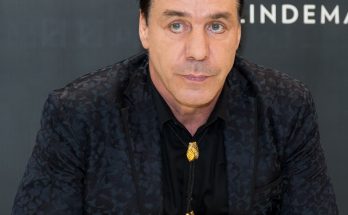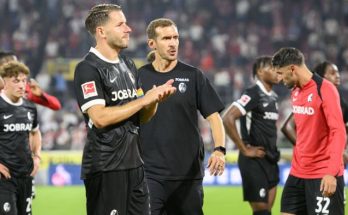In a move that has caught the NBA world’s attention, the Los Angeles Lakers have officially signed 7-foot center Christian Koloko to a two-way contract, signaling a bold and strategic pivot by the franchise as they continue to shore up their roster for the 2025–26 season. This decision not only fills a critical need for size and defensive length but also brings into focus the Lakers’ evolving roster-building philosophy—a blend of youth development, injury contingency, and long-term value creation.
Christian Koloko, a Cameroonian-born big man who made waves at the University of Arizona before being drafted by the Toronto Raptors in the second round of the 2022 NBA Draft, enters this opportunity with the Lakers under circumstances that carry both promise and urgency. At 7 feet tall with a 7’5″ wingspan, Koloko presents a physical profile that’s become increasingly rare in a league trending toward positional fluidity. Yet, what makes him uniquely valuable is not just his size but his defensive instincts, shot-blocking prowess, and the upside that remains largely untapped due to limited NBA minutes and an unfortunate health setback.
Koloko spent the majority of his rookie year with the Raptors displaying flashes of elite rim protection and surprising mobility for someone of his stature. He averaged 1.3 blocks per game in just under 20 minutes during his limited NBA appearances and held his own in matchups against some of the league’s premier bigs. His role in pick-and-roll coverage, defensive switches, and weak-side help defense was promising enough to make many analysts project him as a long-term rotational piece. However, lingering respiratory issues sidelined him for the entire 2023–24 season, halting his development and forcing the Raptors to ultimately move on.
This is precisely where the Lakers have identified a potential low-risk, high-reward scenario. Two-way contracts allow teams to carry an extra developmental player who can shuttle between the NBA squad and its G-League affiliate—in this case, the South Bay Lakers—without taking up a standard roster spot. For Koloko, it offers a pathway back to full NBA relevance. For the Lakers, it provides an opportunity to nurture a high-upside defensive big man at a time when they are searching for depth, rim protection, and future anchors.
The Lakers have long struggled to find a true backup center who can spell minutes for Anthony Davis or even play alongside him in dual-big lineups. Since the team’s 2020 championship season, when Dwight Howard and JaVale McGee formed a formidable shot-blocking duo, the team has rotated through a carousel of bigs—none of whom have offered sustained impact or consistent availability. Whether it was the aged DeAndre Jordan, undersized Thomas Bryant, or the experiment with Christian Wood, Los Angeles has failed to find a long-term fit at the backup center position. In Koloko, they may have found someone who not only provides defensive insurance but also fits seamlessly into their preferred defensive schemes.
Darvin Ham’s defensive philosophy, rooted in mobility, help-side awareness, and rim deterrence, aligns well with Koloko’s strengths. In college, Koloko was a menace in the paint, leading the Pac-12 in blocks and earning Defensive Player of the Year honors. His timing and verticality made him a nightmare for slashers, while his agility allowed him to hedge and recover effectively in ball-screen situations. This isn’t to say he’s without flaws—his offensive game remains raw, and questions linger about his durability—but the Lakers are betting that with the right support system, those weaknesses can be minimized or transformed over time.
It’s also worth exploring the timing and context of this signing. The Lakers are currently in a delicate phase of roster retooling. After a disappointing second-round playoff exit in 2025, the front office—led by Rob Pelinka—has prioritized flexibility and youth. The team recently selected Dalton Knecht in the NBA Draft and re-signed LeBron James to what many believe could be his final contract. With a veteran-heavy core that includes LeBron, Anthony Davis, D’Angelo Russell, and Rui Hachimura, injecting youth and athleticism has become a quiet but urgent necessity. Koloko, at just 24 years old, fits squarely within this youth movement.
Moreover, signing Koloko to a two-way deal—rather than a full standard contract—offers the Lakers cap flexibility. The team is navigating a tight salary cap landscape, especially with the new collective bargaining agreement’s apron rules making it increasingly difficult for high-spending teams to maneuver. A two-way deal doesn’t count against the cap in the same way and allows the Lakers to experiment without long-term financial commitment. Should Koloko excel, the team retains his rights and can convert his deal into a standard contract down the line.
From a player development standpoint, this move also aligns with the Lakers’ revitalized emphasis on their G-League pipeline. The South Bay Lakers have become one of the more competent developmental programs in recent years, with players like Austin Reaves and Max Christie getting seasoning there before breaking into the main roster. The plan for Koloko is likely to follow a similar route: allow him to log heavy minutes in the G-League, build back his conditioning post-injury, refine his offensive reads, and then transition him into meaningful minutes on the NBA court as needed.
Koloko’s offensive limitations are widely acknowledged, but they are not unworkable. He lacks a consistent jump shot and isn’t a playmaker from the elbow or post in the mold of Nikola Jokic or even Bam Adebayo. However, he has proven to be an efficient rim-runner and lob threat in transition and pick-and-roll settings. His ability to finish above the rim with authority, combined with his offensive rebounding tenacity, makes him a serviceable low-usage scoring option—something the Lakers can integrate without disrupting their established offensive hierarchy.
LeBron James, ever the floor general and IQ savant, thrives alongside rim-running bigs who can set solid screens and finish lobs. The pairing could be reminiscent of the chemistry LeBron had with JaVale McGee during their 2019–20 campaign. Likewise, Anthony Davis has always benefited from sharing the floor with another big who can absorb some of the physical toll of playing center full-time. Koloko, if he earns that trust, can provide just enough resistance in the paint to allow Davis to float more freely defensively, where he can wreak havoc as a help defender.
The Lakers’ fan base has had mixed reactions—some hopeful, others skeptical. It’s easy to see why. Koloko is coming off a year-long absence due to health issues and is relatively unproven at the NBA level. There are legitimate concerns about his ability to adapt to the speed and spacing of modern NBA offenses. However, these are precisely the type of swings that successful organizations must take—calculated risks on young talent with upside, rather than overpaying for aging veterans who offer diminishing returns.
One often overlooked aspect of Koloko’s profile is his basketball IQ and character. Coaches and teammates from Arizona and Toronto alike have spoken glowingly about his work ethic, humility, and willingness to be coached. These traits matter—especially in the demanding, high-stakes environment of the Lakers organization, where media scrutiny is relentless, and internal chemistry often dictates success more than talent alone. Koloko’s demeanor and desire to improve bode well for his ability to stick around and evolve.
There’s also an international element to this story that deserves appreciation. Koloko is part of the growing wave of African-born players making their mark in the NBA. Following in the footsteps of Hakeem Olajuwon, Serge Ibaka, and Pascal Siakam, he represents the expanding global talent pool reshaping the league. His signing further solidifies the Lakers’ commitment to international scouting and embracing talent from non-traditional backgrounds—an increasingly important trend in today’s game.
This move might not shake the betting lines or dominate ESPN’s front page, but it exemplifies the kind of under-the-radar roster building that often pays dividends deep into the season. Injuries are inevitable. Fatigue is real. In a Western Conference loaded with versatile bigs—think Nikola Jokic, Deandre Ayton, Chet Holmgren, and Victor Wembanyama—having a legitimate 7-footer on hand who can offer 12 to 18 minutes of solid interior defense is a luxury. Koloko’s presence won’t just be insurance—it could become a necessity.
Whether Koloko earns a full-time rotation spot or remains a developmental piece, the Lakers are playing the long game. They’re not simply reacting to short-term roster deficiencies; they are planting seeds that could blossom into meaningful production down the line. That’s how dynasties sustain themselves—not just by swinging for the big-name trades but by recognizing overlooked talent and fostering its growth.
In a season expected to be filled with drama—LeBron’s twilight, Anthony Davis’s leadership evolution, new coaching tweaks, and ongoing trade rumors—Koloko’s journey will fly under the radar. But within the Lakers’ facility, this signing is more than just a formality. It’s a bet on potential, a nod to development, and a commitment to keeping the franchise’s pipeline of talent flowing, even as they chase immediate contention.
If all goes well, Christian Koloko may become one of the season’s quiet success stories. If not, the Lakers still retain a flexible contract, a learning opportunity, and a signal that they’re willing to dig deeper than just top-tier names to build a winning culture. Either way, this signing is more than a footnote—it’s a reflection of a franchise recalibrating how it builds toward the future without abandoning its win-now ethos. That balance is delicate, but if the Lakers play their cards right, Koloko could very well be one of the smartest under-the-radar additions of the season.



